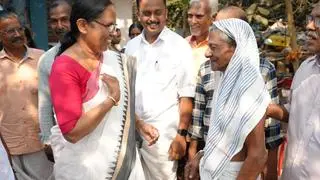In a subtle message on sustainability, Prime Minister Narendra Modi on Wednesday donned a blue jacket, produced out of fibre that was entirely made with recycled pet bottles by Karur-based Shree Renga Polymers, while presenting his speech at the Parliament.
While there are a few global brands that have started to use sustainable fibres, Shree Renga Polymers has already become a pioneer in sustainable textiles in the country.
The 14-year-old company from Tamil Nadu has been producing fibres out of recycled pet bottles. It also makes and sells yarn as well as its brand of garments, under the brand name Ecoline Clothing, made out of its fibres.
The company collects used pet bottles, crush, melt, add colour and produce fibre, which will be made into yarn as also garments. This process saves at least 90 per cent water and 50 per cent energy when compared with the traditional process.
As a result of this, the emission is cut drastically in the production process. So the company’s sustainable process brings with it a circular model such that there is no damage to the environment.
Shree Renga Polymers collects about 15 lakh used pet bottles a day through its collection centres across the State. A normal T-shirt could be produced by crushing eight bottles, while a trouser or a jacket may require about 20 bottles.
The company was founded by K Sankar, who completed his M Tech in Polymer Technology at the IIT-New Delhi. He has close to four decades of work experience across industries including plastic, rubber and fibre.
Growing need for sustainable fashion
The ‘sustainability’ message comes at the right time. As there is a global focus on climate change, it has increasingly been imperative for textile and garment manufacturers to realign their operations to improve their ecological footprint and embrace alternative fibres that are recyclable and environment-friendly.
It is estimated that globally, one-fifth of industrial water pollution is contributed by the textile industry and 35 kg of textile waste is generated per person every year in the US alone. So, countries across the globe are implementing measures to shift toward sustainability.
European Union (EU) has already taken the lead to achieve sustainability in the textile sector by 2030. The shift in the EU’s journey towards sustainability will impact the Indian suppliers significantly and they need to prepare for the change as Europe is their biggest market.








Comments
Comments have to be in English, and in full sentences. They cannot be abusive or personal. Please abide by our community guidelines for posting your comments.
We have migrated to a new commenting platform. If you are already a registered user of TheHindu Businessline and logged in, you may continue to engage with our articles. If you do not have an account please register and login to post comments. Users can access their older comments by logging into their accounts on Vuukle.